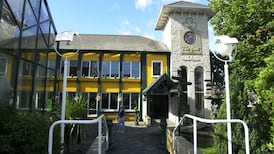Irish inflation accelerated again last month as domestic price pressures in hospitality and other sectors remained strong.
The latest consumer price index (CPI) put the annualised rate of price growth at 1.4 per cent in December, up from 1 per cent the previous month.
Despite the increase, the headline rate remained close to a three-year low and well down on the levels seen in 2022 and 2023 at the height of the energy price shock.
The European Central Bank (ECB) has warned that inflation readouts in the coming months will be choppy but that the overall trend will continue to be downward. Euro zone inflation rose to 2.4 per cent in December, according to Eurostat.
How three Irish companies are adapting to Trump’s tariffs
ECB interest rate cut: What does it mean for mortgage borrowers on trackers, fixed and variable rates?
Failure to connect electricity systems on island of Ireland has led to higher prices and greater emissions
Profits at LinkedIn’s Irish unit surge
Some of the month-on-month acceleration was linked to statistical base effects – the difference between the annual inflation rates in the two comparator months.
In its latest figures, the Central Statistics Office (CSO) said the annual average rate of inflation last year was 2.1 per cent. This compares to an increase of 6.3 per cent for 2023 and an increase of 7.8 per cent for 2022.
[ Euro zone inflation rises to 2.4% in DecemberOpens in new window ]
The largest price increases were recorded for restaurants and hotels (+4.7 per cent), recreation and culture (+4.4 per cent), alcoholic beverages and tobacco (+3.7 per cent) and miscellaneous goods and services which includes insurance (+3.3 per cent).
“The annual change in restaurants and hotels costs reflects higher prices for food and alcoholic drinks consumed in licensed premises, restaurants, cafes etc,” the CSO noted.

Is Ireland’s planning system broken?
Parties in the new Irish coalition are said to have agreed to a reduced rate of VAT of 9 per cent for part of the hospitality sector but not until the next budget.
The CSO figures indicated the only decreases were recorded for clothing and footwear (-6.1 per cent) and furnishings, household equipment and routine household maintenance (-0.7 per cent).
The CSO said that during 2024, prices for energy products fell on average by 7.7 per cent compared to an increase of 5.1 per cent in 2023.
It also noted that the price of goods increased on average by 0.2 per cent compared to a rise of 3.2 per cent in 2023 while the price of services, which includes mortgage interest, rose by 3.4 per cent compared to a rise of 8.7 per cent the previous year.
ECB policymakers have been concerned about elevated levels of price growth in the services sector driven by higher wage demands. The latest figures point to an underlying rate of price growth, which excludes energy and food, of 2.1 per cent in December.
Markets expect the ECB to continue reducing interest rates this year as inflation eases but incoming US president Donald Trump’s threat to impose tariffs on US imports has thrown a spanner in the works. Such a move could reignite inflation.
The ECB cut interest rates for the third time in a row in December and said that further reductions may be on the way as inflation could hit 2 per cent around midyear, even if the timing and pace of rate cuts was still up for discussion.
The ECB will next meet on January 30th and investors have fully priced another 25 basis point cut in its 3 per cent deposit rate. – Additional reporting by Reuters
- Sign up for the Business Today newsletter and get the latest business news and commentary in your inbox every weekday morning
- Opt in to Business push alerts and have the best news, analysis and comment delivered directly to your phone
- Join The Irish Times on WhatsApp and stay up to date
- Our Inside Business podcast is published weekly – Find the latest episode here















